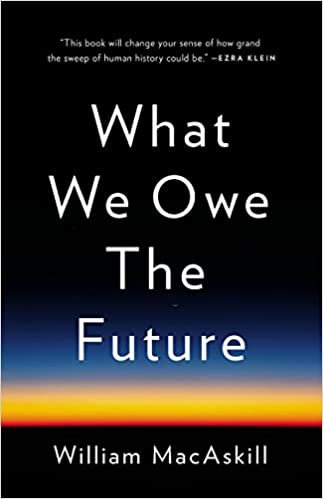An Immodest Proposal
Notes on a characteristic idea of our time
Friends,
I’m here today to consider a proposition that has gained some currency lately: it’s called longtermism. I think you’ll agree that it’s pretty remarkable.
First coined a few years ago, longtermism has received significant attention lately through the work of Oxford philosopher William MacAskill, whose new book, What We Owe the Future, has just been published by Basic Books. The New York Times recently published a full-page op-ed drawn from MacAskill’s work, The Atlantic published one of his essays this week, and he was featured earlier this month on Ezra Klein’s podcast that begins with Klein distilling MacAskill’s work into three sentences he says could change the world: “Future people count. There could be a lot of them. We can make their lives better.”
MacAskill has usefully summarized his work himself in a piece he wrote for the BBC:
Longtermism is the view that positively influencing the long-term future is a key moral priority of our time. It's about taking seriously the sheer scale of the future, and how high the stakes might be in shaping it. It means thinking about the challenges we might face in our lifetimes that could impact civilisation’s whole trajectory, and taking action to benefit not just the present generation, but all generations to come.
The case for longtermism rests on the simple idea that future people matter. This is common sense. We care about the impacts of climate change, radioactive nuclear waste, and resource depletion not just because they affect our lives, but because they affect the lives of our grandchildren, and their grandchildren in turn. If you could prevent a genocide in a thousand years, the fact that "those people don't exist yet" would do nothing to justify inaction.
Let’s explore this “common sense” idea a little further, shall we?
I’ll start by saying that my efforts at longtermism have been largely focused on striving to raise children to become productive taxpayers and active citizens who enrich the lives of those around them. Fortunately for me, MacAskill does offer some encouragement in that regard. “We could once again see having kids as a way of contributing positively to the world,” he notes amid a discussion of concerns about the ethics of having children (pp. 187-188). I can’t tell you how pleased I would be to have the blessing of those who might see fit to relinquish their disapproval of such a notion.
But it’s clear that longtermists have a much more ambitious agenda in mind. Take, for example, the genocide question. MacAskill enjoins us to take active steps to avoid its realization a thousand years hence. That’s a bit of a daunting proposition, I must confess. But a look at recent history makes the quality of his logic evident. If, say, antiwar activists in the 1930s had succeeded in preventing the Second World War, there might have been no Manhattan Project, which could have spared the world the problem of the United States acquiring the Atomic Bomb. I know we all concur on how much better off future generations would have been. In any case, collectively foreseeing the right thing—agreeing on what it is, and how to accomplish it—shouldn’t be that hard. Certainly no more difficult for the future than it is now.
Of course, we shouldn’t expect people in the past to be as enlightened as we are. For example, it is now well understood that the middle of the seventeenth century was a time of significant global cooling. Not caused by humans (as far as we know). But if the good people of the world had been able to come together to prevent climate change back then, they might have been able to prevent the rise of the West—all those North Atlantic migrants who otherwise would have perished as the result of non-frozen microbes—and so many of the undeniably unfortunate byproducts that have come with it. (You and I would have zero carbon footprint!) They didn’t understand. But we do, and have an obligation to sustain the truths of our time for all time. Naturally, it’s preferable they rest on the precepts of science rather than rely so heavily on the evangelical religions that played such a prominent role in the abolitionist and civil rights movements, because we have more expertise. And in a democracy you can’t have too much of that.
It is of course true that even in our relatively enlightened age, we have those who continue to insist on retrograde notions. Like those who fail to understand that climate change poses a bigger danger to the future of the planet than Vladimir Putin, which is why ending reliance on fossil fuels is obviously more urgent than energy independence.
Then there are those who insist on the sanctity of human life, the rights of the unborn child, blah, blah, blah. So annoying. Like those crazy radical Quakers MacAskill talks about, though of course they were right and these people are wrong. As one might confidently predict of a longtermist, MacAskill asserts “I certainly don’t think the government should restrict abortion rights” (p. 188). If we simply recognize that undesirable fertilized human eggs are better off never being born, we can avoid the distractions posed by such not-quite hypothetical lives and dedicate ourselves to focusing on more purely abstract future ones.
Because that’s what longtermism is all about: knowing better.


